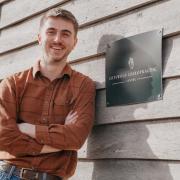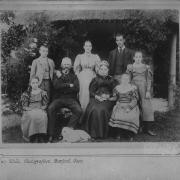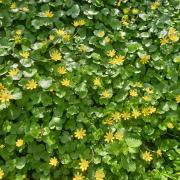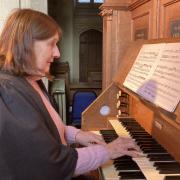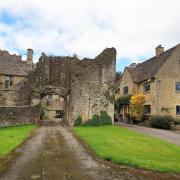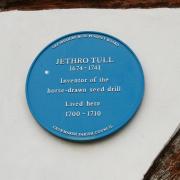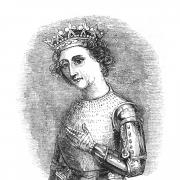Two farmers offer different insights into growing nutritious food while looking after soil health and encouraging biodiversity
‘I think provenance is absolutely key. When you know where your food comes from you are creating a connection, a possible door opening to the people who grow it,’ Henry Astor says. ‘Food production has become unbelievably impersonalised in the modern system. I would really like customers to ask: where does my food come from and to follow the answer back to the source and engage with that person.’
Following the answer back in this instance takes us to third-generation, family-run Bruern Farms in the North East Cotswolds: 1250 acres of predominantly arable farming, with a small herd of longhorn cattle and some saddleback pigs; land is also used by a young couple building up a sheep business.
Much has changed since Henry’s grandfather bought the farm in 1946. ‘It was a conventional farming system with a three-crop rotation, wheat, barley and rapeseed. We’ve introduced more diverse crops – buckwheat, beans, various heritage wheats and heritage barleys.
‘As part of the diversity we’ve also built a farm shop that we put a lot of our food through and we have a café. That has created a community around growing food. We used to have two people working on the farm and one in the woods; now there are probably 20 people working here in different capacities.’

Everything done on the farm is aimed at building better soil health, growing food in a nutritious way and trying to increase biodiversity. This means a low-input approach, for example planting strips of wildflowers and plants in fields to attract predator insects that keep aphids down, rather than reaching for chemical deterrents. Pools and dams not only help to prevent flooding in the village but also encourage wildlife; while woodland and hedge management, and putting sheep on early wheat fields to help suppress weeds – are among other nurturing practices.
A champion of producing local food for local people, Henry works with many partners and organisations that share the same values. He was recently instrumental in setting up The Cotswold Grain Network: a group of bakers, farmers, brewers and researchers who want to re-imagine the grain economy in the Cotswolds.
‘It is a kind of antidote to the agri-business system that we as farmers find ourselves in, where farmers take all the risks and we are competing in a global market,’ Henry explains. ‘The network was set up to grow grain and mill flour, and to deliver it directly to bakeries in the Cotswolds area. We are trying to keep the supply chain as short as possible, reducing our carbon footprint, empowering farmers through direct sales, and empowering bakeries with the fact that they know which farm their flour comes from, and what is in that flour. We are creating a web of connections that builds community around the business model.’
The group promotes heritage and non-commodity grains. ‘Heritage grains, like Red Lammas and Olands, are grains that were in fields pre-1906 when hybridisation really took off. They are not as intensive, but they grow much taller, they’ve got deeper root systems, higher nutrient value, and stronger straw stems.’
Henry used funding from a Farming in Protected Landscapes grant towards setting up a community mill for the network, from which flour is taken to local bakers. ‘Spending time chatting with bakers, finding out how they will use the flour, personalises food production,’ he says, adding: ‘I enjoy what I do; I am also realistic – I doubt I can change the [national] model of farming. However I can provide food from my farm to a local community. Engaging people in that process has meaningful implications.’
Bruern Farms: bruernfarms.co.uk
The Cotswold Grain Network
(Instagram): @cotswoldgrainnetwork
Taking diversity nationwide
Sam Phillips is a fourth generation farmer at Macaroni Farm, Eastleach. ‘Although I grew up on the farm, I never wanted to be a farmer and I had another career in London for eight years. Then I realised there is this attachment to the land that you can’t ignore,’ he says. ‘It is exciting; every day you learn something.’
The farm’s unusual name is thought to derive from a bunch of Georgian dandies who liked to dress in Italian-style clothing – the Macaroni Club – and stabled their horses here when they came to watch the races at Cheltenham. It is now run, including a joint venture partnership with neighbours, as a 5,000-acre mixed organic farm, growing wheat for flour and barley for malt used in brewing.
Discussions in 2016/17 over how to farm in a nature-friendly way – building soil health and reversing biodiversity decline – while being profitable, without farm subsidies, drove a focus towards low-input, low-risk systems ‘where we have more control over our destiny,’ Sam says.
They adopt as many regenerative principles as they can and initiatives include: avoiding chemical use; reducing tillage; integrating livestock (especially dairy cows) into arable systems to fertilise the ground; and keeping naturally wool-shedding sheep whose fleece helps to increase soil organic matter.
They also grow cover crops to maintain continual living roots in the ground. ‘After harvest, we direct drill with a multi-species cover crop – brassicas, legumes, cereals, grasses, herbs – not only to feed the microbes in the soil but also to feed our livestock over winter.’ Sam is in the process of developing a bid for a Farming in Protected Landscapes grant to purchase a drill that can simultaneously seed three different seed species at three different depths to ‘produce this amazing mixed salad for the cows and sheep’.
‘Diversity is key, mimicking nature, and getting away from monocultures,’ he says. It is one of the principles behind WildFarmed, which Sam recently joined and whose co-founder Andy Cato is a neighbouring farmer and friend.
‘Wildfarmed wants to create a mainstream alternative to traditional chemical farming and members don’t use any ’cides – herbicide, fungicide, pesticide,’ Sam explains. ‘They and I believe in using as much diversity as possible, using livestock within the system, using cover crops to reduce tillage – a lot of people worry about loss of yield but we can actually produce more calories per hectare than in a traditional system.’
Taking a restorative, sustainable approach to farming that puts soil health first and rewards quality rather than quantity, Wildfarmed is a growing nationwide network, with wheat from members collectively turned into branded flour. ‘They have managed to get some bread into M&S. We are trying to reach a wide audience.’ There are plans for barley to be used in a beer.
Summing up Sam says, ‘There are different approaches to farming but what is really important is that we are trying to get to the same place: making the land that is in production work for nature, the climate and growing nutritious food accessible to everyone, while making sure a farm is profitable.’
Macaroni Farm: macaroni-farm.co.uk
Wildfarmed: wildfarmed.co.uk












